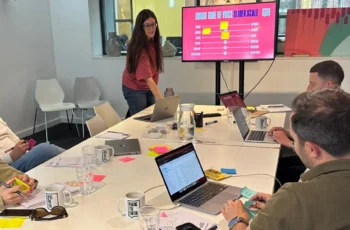How Is Barnabus Tackling Manchester’s Growing Homelessness Problem?
We’re proud of our Manchester roots, and have been looking for ways to give back to the community as we’ve grown. Perhaps the biggest challenge facing our city is homelessness – something that everyone in our team feels passionately about.
Having been introduced to the amazing work of Barnabus before, we were delighted to select them as our Charity of the Year 2019. Eager to get under the skin of the organisation ahead of supporting their marketing efforts, we decided to put writers on the ground and kick off the year by mucking in with their volunteers.
Our day at Barnabus’ drop-in centre was a real eye-opener for the team, and it taught us a lot about Manchester’s homeless community, the challenges charities face in supporting vulnerable people, and how companies like ours can pitch in to help their resources stretch further…
What were you expecting before your visit to the drop-in centre?
Josh: “In all honesty, I envisioned a long line of people presenting themselves, one by one, to receive their food like in a school cafeteria. I didn’t know there’d be a clothing room too. My mind’s eye saw a wide dining hall, and little else. I had no idea the extent to which Barnabus could support people aside from keeping their bellies full.”
Sam: “I had a hard time picturing how the service could be organised. Living in town myself, the scale of the homelessness in the city makes it difficult to imagine how they could accommodate the numbers that they do. I expected a food hall where service users would pick up the warm food, change clothes and shower if necessary, leaving promptly after.
“I imagined the service would be so inundated with members of the homeless community that there would be little communication and the volunteers would act almost formally in their conversation to individuals.”
Kelly: “I’d popped by the centre before so already had a good idea of the service Barnabus provided, however I wasn’t sure what to expect of the visitors. I knew they had a doorman, which led me to wonder exactly who I was going to be coming across…”
How did this compare to your experience?
Kelly: “What surprised me most was the diversity of the people who came through Barnabus’ doors, and the energy that brought the centre to life as familiar faces came and went. It soon became clear that The Beacon, as it’s known, is exactly that in the lives of those it supports – and visitors are greeted as welcome friends, not desperate people in need.”
Sam: “The building itself couldn’t be further from how I imagined it – a three-storey space in the centre of the Gay Village. It seemed as much a part of the community as the bars and nightclubs are, unrecognisable to the average passer-by but everything to those who know it’s there. Volunteers consisted of full- and part-time workers, students and previous sufferers of homelessness.
“Once service started, I was surprised to see the facility take the form of café as opposed to a shelter. All the volunteers took their positions and waited while members of the public entered the facility, were greeted by Frank the doorman, and began queuing for their food and drink. Frank seemed to know all users of the service immediately; I hadn’t anticipated the familiarity and trust this charity had built with its local community.
There was no us and them (aside from our high-visibility vests!), and volunteers were as chatty as the community they support. With MYC being the latest addition to the Barnabus shelter, it was us who appeared the odd ones out at first. However, we were quickly welcomed in by both sides of the service.”
Lucinda: “We were rushed off our feet! The centre was a lot bigger than I thought it would be too. Kelly and I spent most of the morning with Liza, who runs a tight ship in the kitchen. She was lovely, had plenty of stories to tell and made sure that we had everything we needed.
“The kitchen ran non-stop between the hours it was open, and we were told at the end of the session that they often get busier days than the one we had. Barnabus offer unlimited toast, tea, coffee and cereal to those that walk through their door, with the option to pay a small amount for a full cooked breakfast.”
Josh: “Being stationed on clothing duty was an eye-opener, because the sheer number of garments – held in boxes, racks, and itemised drawers – was daunting at first. Sixteen people came to get new outfits or toiletries. There was a shower, which anyone could use for 10-15 minutes if they were approved on a list. Anyone who didn’t wash up could collect socks, underwear, deodorant or a hat and gloves. Those who did choose to clean up here were entitled to a complete clothing set, including a jacket or shoes if they needed them. My job was to stand at the desk, take names, and select apparel for each request. You might say I was a street stylist!”
Did you learn anything new during your trip to Barnabus?
Lucinda: “It was great to learn more about all the services that Barnabus offer. They are so much more than a morning and evening meal – they offer showers, clean clothes, health advice, a place to talk and hang out… and that’s just the drop-in centre.
“They also have a support office down the road where people can find accommodation and employment, as well as a variety of projects off-site that teach skills like gardening and furniture renovation.”
Sam: “Before Barnabus, I had no idea that there were organisations that would offer cleaning facilities that included food and a change of clothes. It wasn’t something I had considered: the need for fresh towels, the supervision of bathroom spaces and to have a conversation with someone.
“The nurse who had dedicated her time to assess the community explained prior to the session that the majority of her patients enter her office complaining of small wounds and minor cuts – but they are also given the space to open up about any mental health concerns they have.”
Kelly: “Spending time in the centre really challenged my perceptions of homeless people as a whole. I hadn’t realised, for example, that there are so many types of homelessness. Barnabus mainly supports rough sleepers, although some of the visitors were in temporary accommodation.
“Hearing the stories of those who came and went – from victims of domestic abuse to ex-soldiers who’ve ended up on the streets, to those who simply couldn’t find affordable housing – really opened my eyes to the scale of Manchester’s problem.”
Josh: “I think the sheer cheerfulness and gratitude of those we served – from young and old attendants alike – warmed my heart, more so than I was prepared for. Almost everyone was blessing our presence that day. They just wanted something to carry them through another few nights, which meant we had to consider which shoes and coats would be worth their weight in the January cold.
“Ness, my partner for the day, was unflappable in this regard. And I worked quickly, giving some people a choice of three or more outfits, even as another visitor was being seen to. One crucial detail was the dearth of men’s trousers and jeans, which went very swiftly in sizes 30-34”. Shelter staff told me they always require more.”
Tell us about the people you met on the day
Sam: “Those who used the service were clearly comfortable in the shelter, accustomed to the rules and grateful of the service. There was no animosity, instead a clear sense of community among those who attended. They talked about everything you’d hear anywhere else: Brexit, clothes, local issues…
“Liza, the lead volunteer in the kitchen laughed and joked with the majority of visitors – going so far to remember many of their orders! For some of the younger users, the female volunteers acted almost motherly (or teacher-like), being called miss and lowering their guard when discussing medical concerns.”
Josh: “There was George, a man on the verge of getting the keys to a flat in the city, looking forward to painting the walls himself. There was Tommy, a Jack the Lad who sleeps in a casino carpark. All of them were extremely gracious, although some threatened (jokingly) to break the shower door down when the previous occupant was taking too long!”
What value do you think volunteers bring to organisations like these?
Lucinda: “On our volunteer day, I was surprised when it looked as if Barnabus wouldn’t be able to offer all of its drop-in services due to a lack of experienced volunteers. Because it was our first time there, we would only be able to help with the basics – serving food and drinks and helping out in the main area. Luckily, there were a couple of returning volunteers so the centre could open fully.
“Volunteering means that organisations like these can continue to provide such a valuable lifeline every day.”
Josh: “The chief qualities of volunteers are persistence, a smile, and the sight of a fresh face – those who use Barnabus are too often ignored by Manchester’s residents, so talking to them one-on-one seemed to lift their mood. Of course, there’s the practical side as well: remembering what everyone wants or, failing that, what they can get as a backup outfit. I had to stay on my toes, and was rejuvenated with every ‘thank you, mate’.”
Sam: “Previously, I felt like we were an extra pair of hands. We help deliver the service and challenge certain stigmas associated with the homeless community. Once we’d finished our shift though, Ben (the group leader) explained that, without certain numbers, they couldn’t run some of their facilities. They needed numbers so that they could run the showers, operate the doctor’s practice, and deliver food and hot drinks. Without volunteers, they can’t safely operate and that would harm the community that relies on Barnabus’ support.
Kelly: “I knew that Barnabus was mainly funded by donations, but talking to Liza in the kitchen really hit home what a big impact even the smallest contributions can make. She joked that she would keep it open 24/7 if she could, but on current resources the centre can only open five mornings and four afternoons or evenings a week. The 50p price of a hot meal doesn’t even cover the cost, so even food donations such as fresh meat and vegetables are gratefully received at the centre.
“Of course, the biggest pressure on resources for Barnabus is time. That’s why we’ve pledged to give 100 hours over the course of 2019 to the charity, supporting their marketing as well as volunteering at the centre.”
Reflecting on the day
By the time The Beacon closed its doors on Monday afternoon, we’d provided countless rounds of tea, toast and breakfast to its 50 visitors, as well as providing washing facilities for 10 people and clean clothes for a further 16. They even had one newcomer to the centre, who they were planning to see again the day after so they could learn more about his story and signpost him to the relevant support.
We are already looking ahead to our next visit to Barnabus, but in the meantime the shelter is always in need of donations – especially during the winter months. If you’re looking for a simple way to support, are you able to drop any of the following items over to their Bloom Street centre?
- Small men’s clothes, especially trousers up to waist 34”
- Small women’s bras
- Hats, scarves and clothes
- Shoes
- Fresh meat and veg
- Store cupboard items, such as beans and custard
For more information about Barnabus, visit: www.barnabus-manchester.org.uk.




